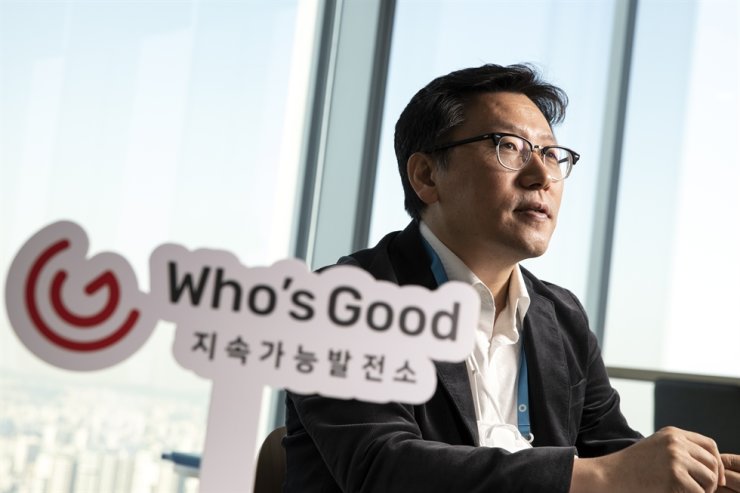[INTERVIEW] ‘Robots better than humans in ESG analysis’
 |
| Who’s Good CEO Thomas Yoon speaks during an interview with The Korea Times at his office in Seoul, Oct. 25. Korea Times photo by Choi Won-suk |
 |
‘Bad news’ enables AI to assess business risks
By Park Jae-hyuk
The so-called “AlphaGo shock” in 2016, which marked the first time that a computer program defeated a human Go player, showed that artificial intelligence (AI) can surpass humans in fields that had been considered too difficult for machines to understand, sparking the use of technology across a much wider range of sectors.
One of these is the analysis of the environmental, social and governance (ESG) factors of businesses, which has emerged as one of the hottest issues in the capital market.
Who’s Good CEO Thomas Yoon, who established Asia’s first AI-based ESG ratings agency even before the AlphaGo shock, emphasized that machines are better than human analysts in terms of unbiased and faster analysis of ESG data.
“When I had just founded the company in 2013, I introduced it as an agency employing big data technology, because the market was prejudiced against AI at that time,” he told The Korea Times in a recent interview. “But after the advent of AlphaGo, my company began to draw a huge amount of attention from the National Pension Service and multiple institutional investors.”
Yoon cited problems in conventional methods of assessing ESG, used by global institutions, as the biggest reason for him to decide to use AI in ESG ratings.
“Several Korean companies took the top spot in the Dow Jones Sustainability Indices (DJSI) in the early 2010s, after getting advice from consulting firms, because the assessment relied on surveys,” he said. “The consultants helped Korean firms choose the best answers.”
In order to enhance the credibility of ESG ratings, Who’s Good has collected news reports related to companies by using AI, and assessed business risks mentioned in those articles. It has also analyzed regulatory filings as other ratings agencies do.
“Because we are assessing business risks, our program filters advertorials and promotional articles,” Yoon said. “It is actually difficult for AI to distinguish fake news at the moment, so we have also used news from traditional media, without collecting data from social media and YouTube.”
He added that inaccurate reports coming from older media companies can be filtered through fact-checking in other news outlets and refutations from relevant companies.
Spreading ESG across Asia
Based on such methods, Who’s Good monitors the risks facing 2,800 companies in Korea, including public enterprises and unlisted firms subject to external audits.
The CEO said his company plans to start providing its clients with AI-driven analyses of news coverage of 3,000 listed companies in Japan and 600 listed firms in Indonesia from later this year.
In response to concerns over the credibility of data from overseas, Yoon said news reports that are “unpleasant” for companies and their regulatory filings submitted to each country’s government are reliable enough to use for ESG ratings.
“At this moment, our algorithm enables real-time analysis of articles written in Korean, English, Japanese and Bahasa Indonesia,” he said. “In contrast to companies in the U.S. and Europe, there has not been enough data related to ESG assessments of Asian firms.”
Starting next year, Who’s Good will also offer analyses of news on companies in China and Southeast Asian nations.
Aiming to expand its presence across Asia, the company is considering setting up overseas subsidiaries, in addition to its U.S. subsidiary established in Washington D.C., and hiring more foreign employees from various countries to enhance research on foreign companies.
Yoon also mentioned the possibility of his company going public or being sold to financial institutions. The company’s major shareholders currently include the CEO, Korea Investment Partners, the Korea Development Bank, Korea Growth Investment Corp., Kiwoom Investment, DTN Investment, Mirae Holdings and D.CAMP.
Boosting sustainability of SMEs
The CEO agreed with the opinion of other experts that it has become more important for small- and medium-sized enterprises (SMEs) to pursue sustainable management, given that most conglomerates have already set up systems to manage their ESG risks.
He stressed the fact that domestic SMEs face difficulties in raising funds to make their business models more environmentally friendly.
His company therefore recently established a credit bureau as a subsidiary so that SMEs can borrow money from commercial banks based on their sustainability, instead of their credit ratings.
“Banks have failed to fulfill their duties for sustainable finance,” Yoon said. “From now on, they should start playing their roles in the transition into a low-carbon economy.”
Who’s Good has been offering credit reporting services based on AI technology and ESG ratings, even though it does not have a license, because its business model was chosen as an innovative financial service by the government in 2019. However, the deregulatory measure is only effective until 2023, so the company has decided to set up a subsidiary and apply for a license next year.
Yoon said his company will also push ahead with the listing of the credit bureau subsidiary on the stock market.